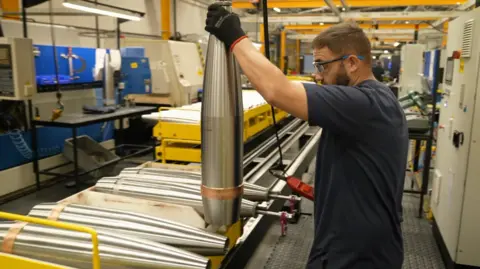In a notable shift towards bolstering its defense capabilities, the UK government has indicated a willingness to invest in securing access to European Union (EU) defense spending programs. These programs represent a significant financial commitment, amounting to hundreds of billions of pounds. Defence Secretary John Healey articulated this position during a recent interview with the BBC, emphasizing the UK’s readiness to “pay our fair share.” However, he highlighted the necessity of retaining influence over the programs while protecting both UK intellectual property and export opportunities.
Healey’s statements come amidst growing concerns regarding geopolitical tensions, particularly in light of Russian aggression and shifting U.S. commitment to European security. As the world commemorates the 80th anniversary of VE Day, discussions about future military needs are increasingly pertinent. In March, Ursula von der Leyen, the president of the European Commission, announced an ambitious initiative to raise up to €800 billion (£680 billion) to enhance European defenses and provide support to Ukraine. The UK government is keen on ensuring that British companies, particularly major defense contractors like BAE Systems, play a significant role in this new spending wave.
The dynamics of modern warfare have influenced the UK’s strategy and defense procurement approach. BAE Systems, for instance, has responded to the demand for various military supplies, ramping up production of 155mm artillery shells that have been vital to Ukraine’s defense against Russia. The facility in Washington Tyne and Wear, alongside its operations in South Wales, is operating around the clock to meet increased global demands that have surged since the onset of the conflict in Ukraine. According to Steve Cardew, BAE’s munitions chief, the company is looking at a sixfold increase in production over the next five years, supported by investments in new technologies and supply chains that favor domestic sourcing.
Amid discussions of increased defense expenditure—promised to rise from 2.3% to 2.5% of GDP by 2027—questions arise as to how effectively these funds will be allocated. While Healey emphasizes the necessity of protecting British jobs and enhancing national security, experts highlight the potential challenge of competing priorities in defense spending. According to Matthew Saville of the Royal United Services Institute, much of the initial funding could go towards addressing existing gaps in the military infrastructure rather than acquiring new weaponry.
Furthermore, the anticipated changes in the battlefield dynamics, notably through the increasing effectiveness of drones and other technologies, are rapidly reshaping military strategies. Ukraine’s emergence as Europe’s largest drone manufacturer serves as a reminder of the evolving nature of warfare, with BAE Systems positioned as a key player in this changing landscape due to its acquisitions and expansions in drone capabilities. This development is reflective of a broader trend where European nations are significantly increasing their defense budgets in response to the precarious security environment brought about by the conflict with Russia.
Moreover, Healey’s emphasis on collaboration with industry reflects a strategic pivot whereby the government seeks to ensure the UK defense sector is robust and well-supported. With the defense industry currently supporting approximately 400,000 jobs, the financial influx from increased spending is expected to particularly benefit British companies involved in the defense supply chain. The UK government believes that involving domestic firms in European defense spending initiatives will not only enhance the nation’s military capabilities but also stimulate economic growth and job creation.
In conclusion, while the UK is pivoting towards greater involvement in EU defense programs, it faces challenges in balancing immediate military needs with long-term strategic objectives. The government’s willingness to invest in accessing EU defense funding highlights an effort to integrate more fully in a cooperative European defense structure while also ensuring that the interests of UK companies and workers remain at the forefront. As Europe continues to grapple with security threats, the outcomes of these strategies will ultimately shape the future of UK defense policy and its role in international military dynamics.



